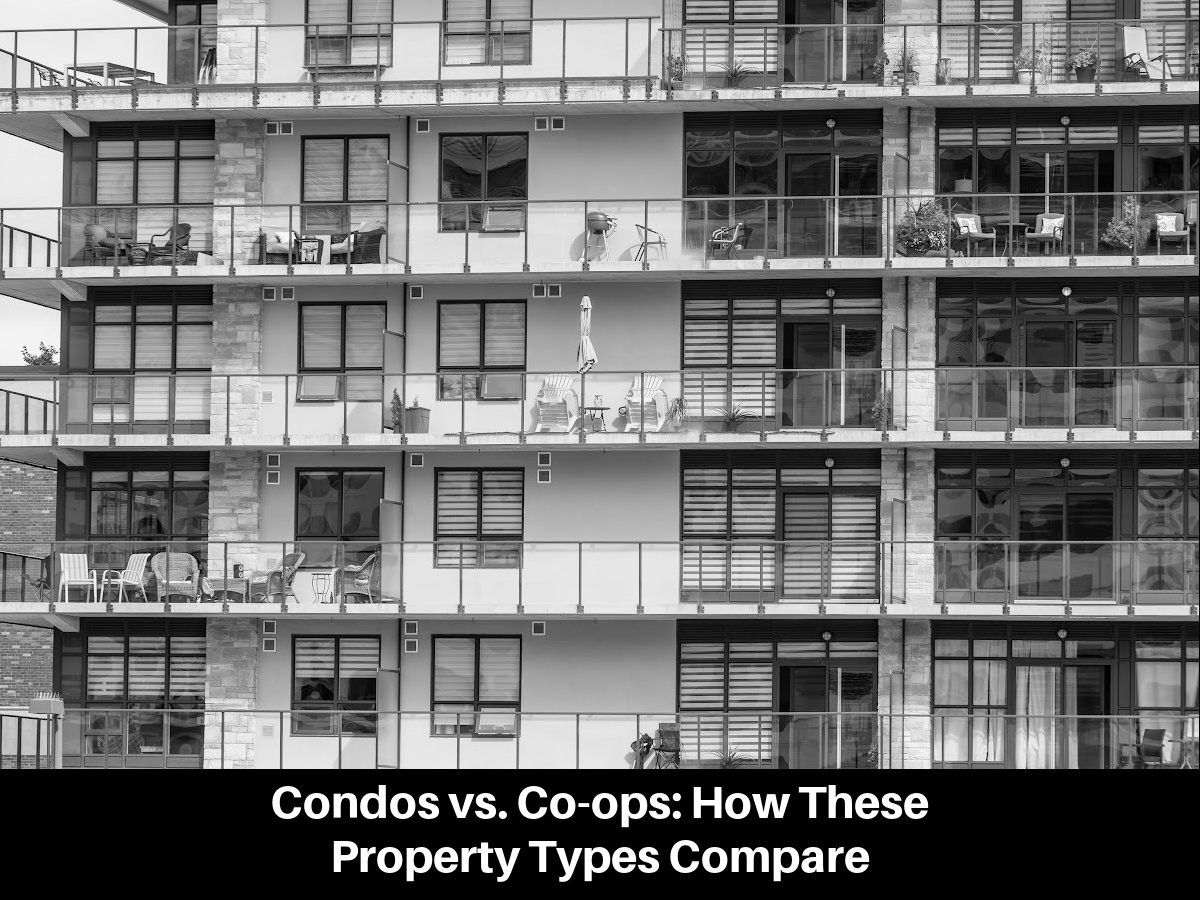Many potential homeowners consider a single-family home to be the ideal to work towards. However, this housing solution isn’t right for everyone. There are many other forms of housing on the market, which include housing cooperatives (co-ops) and condos.

While these types of housing are often confused for one another, they have many differences that you should know about during your search for a new place to live. In this guide, you’ll discover the main differences between co-ops and condos.
Condos Defined
A condominium is a type of real estate that’s privately owned but exists in a larger building. The process of buying a condo is similar to what happens when you buy a single-family home. You’ll work alongside a real estate agent to narrow your options before providing a deposit for the condo you’re interested in. You’ll then go through a short closing process before you’re given the keys to the property.
While some people view condos as apartments, they are substantially different. Apartment buildings consist of multiple units that are owned by a landlord and can be rented out to numerous tenants. A condo refers to a single unit that an individual owner buys and lives in.
Advantages and Disadvantages of Owning a Condo
The main advantages of owning a condo include:
- It’s relatively easy to finance condos in comparison to co-ops
- You have full ownership of the condo as well as common areas
- Your monthly fees will cover maintenance costs
- It’s not that difficult to rent out or sell your condo
The primary issues with owning a condo include:
- High property taxes and closing costs
- Supply and demand isn’t always high
- It’s possible for anyone to purchase a condo in your building without being properly vetted
Condo Ownership
When you buy a condo, you have full ownership of the unit. However, the lobby, gym, and other common areas will be jointly owned by yourself and the other unit owners. The condo association that manages the property functions like a homeowners association. They’ll take care of maintenance problems and make sure the community adheres to certain bylaws. They can also limit the number of pets that owners have and make sure that the use of common areas is regulated. Read up on the rules that your condo association has before closing on the transaction.
Co-ops Defined
A co-op is a kind of housing that allows people to obtain shares in a business that takes ownership of the building, which means that you won’t own the building yourself. If you purchase enough shares, you can obtain a living space in the property. Purchasing a high number of shares gives you the opportunity to claim a large living space.
Co-op buildings are often managed like corporations, which means that they’ll be controlled by a board of shareholders as well as managers and a CEO. As a cooperative stakeholder, your “lease” comes in the form of a proprietary lease, which allows you to live there until you’ve transferred or sold your shares.
Advantages and Disadvantages of a Co-op
The primary advantages of investing in a co-op include:
- With high owner occupancy, other tenants will be invested in maintaining the quality of any shared spaces
- Shareholders don’t have many responsibilities in regard to maintaining the shared common areas
- These living spaces often have lower price points in comparison to single-family homes and condos
- Co-ops often have more amenities than condos
The main issues with owning some shares in a co-op include the following:
- Fees can be high
- It’s possible for co-ops to not accept financing or require large down payments
- Application process is lengthy and time-consuming
- These properties aren’t viewed as investment properties since you’re unable to rent them to other individuals
- Once you’re looking to sell, you’ll first need to find a buyer who will receive approval from the board
Co-op Ownership
When you purchase shares in a co-op, you’ll automatically own a percentage of the business you’re investing in. Since this business is like a company that’s traded on the stock market, each shareholder will be able to vote on various issues that might impact tenants. The handling of maintenance and fee collection is left to a board of members who are elected to the position.
Every owner in a co-op will take a share of the mortgage payments, maintenance fees, and property taxes. This share is proportional to your level of ownership in the building. It’s possible for a co-op to obtain the services of a property management company that can take care of the more granular details of owning a building.
Keep in mind that most co-op associations can be very selective when screening potential buyers. Before you’re able to join and purchase shares, your application must be approved by the co-op board. They need to be confident that you’ll pay all the necessary fees when they’re due and adhere to the community guidelines. Along with reviewing your financial documents, the board might also host an interview with you.
Understanding the Main Differences Between Condos and Co-ops
You’ll find that the main similarity between co-op properties and condos is communal living. However, nearly everything else is different. When you’re trying to understand the difference between a condo and co-op, consider the ownership. As a condo owner, you own a private unit. Co-ops involve owning property shares as opposed to the actual unit you live in.
When considering how the purchase is financed, buying a condo involves applying for a mortgage from your preferred lender. With a co-op, you can either obtain a share loan from your preferred lender or buy shares directly through the cooperative. A share loan comes with a fixed interest rate. In comparison, condos allow for fixed-rate loans, jumbo loans, government loans, and adjustable-rate mortgages.
Consider how equity is handled. When you buy a condo, you’ll be able to build your equity as you pay your loan principal. Your equity can also increase if the property’s market value rises. In a co-op, you’ll earn equity by purchasing additional shares or when the market value changes.
The property taxes you pay are handled differently as well. For example, owning a condo means that your property taxes will be folded into your monthly mortgage payment. In comparison, co-op taxes are placed into the fee assessment you receive every month. Another clear difference between a condo and co-op is that joining a co-op often requires board approval. It’s rare for condo associations to have these same rights.
Deciding Between Condos and Co-ops
Now that you understand the differences between a condo vs. co-op, you should have a better idea of which property is best for your situation. Condos are often more expensive when compared to co-op housing. However, the higher costs give you full ownership of the unit you buy. Your name is placed on the unit’s title and deed. A co-op might be preferable if you’re searching for the most affordable price.
There are many reasons why co-ops have proven popular. If you live in a high-cost-of-living city, co-op housing makes it possible to get away from renting even if you’re unable to afford a single-family home. Since co-ops are focused on making sure that housing costs remain low, they provide you with the unique opportunity to live in a more desirable location.
You might also enjoy the kind of communal living that occurs in co-op buildings. You and your neighbors will work together to effectively manage the property. The main tradeoff involves your inability to obtain high amounts of equity when living in a co-op. If you’re searching for low housing costs, consider a co-op. If you’re fine with living in a slightly worse location while being able to own the unit you live in, think about making an offer on a condo.
Whether you’re most interested in co-ops or condos, these types of housing allow you to gain many of the benefits of owning a home without needing to spend the amount required to purchase a single-family property. It’s impossible to say that one of these options is better than the other.
To determine which property is right for you, consider your financial situation and preferences. What are you looking for in a home? Weigh the advantages and disadvantages of each before you make your decision.


